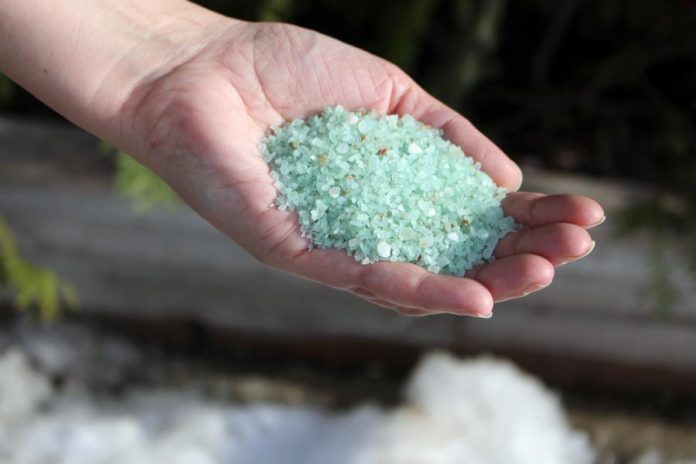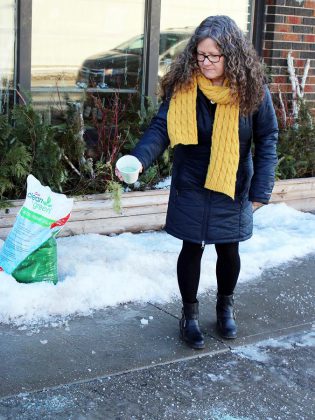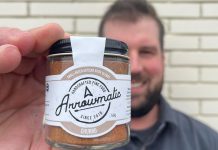
January is here and we are all in full winter mode. The skating rink is open on the canal, Armour Hill is scattered with toboggans, and snowmen can be spotted in yards on every block.
While winter is a favourite season for many outdoor activities, getting around can be stressful in snowy and icy conditions. The recent rain we received over a few warm days has left us with layers of ice hiding under newly fallen snow. Some roads, sidewalks, and driveways are deceptively slippery. The slush that came along with that rain has now frozen into thick, icy mounds making walkways challenging to navigate.
Those of us who were away over the holidays, or hibernating inside, are now left with the tricky challenge of dealing with frozen, icy driveways and porches. Those of you who got out and shoveled right away seem to be in the clear!
Shoveling snow shortly after it falls is one of the best ways to keep your driveway clear and safe. Even if you don’t remove it all, when you thin out the layer of snow, the sun can lend a hand by melting away the excess. This means you can reduce the likelihood of having to reach for supplementary products, like salt, to finish the job.
Sodium chloride is a product commonly used for reducing the amount of ice around homes. It is relatively inexpensive and it works quickly to break up ice, making it easier to clear, but there are many reasons to re-think its use around your home or office.
Salt is corrosive and can cause damage to vehicles and bikes. It is easily tracked inside on the treads of boots causing damage to footwear, carpets, rugs, and flooring. If you have pets, salt can irritate paws and it can be harmful if ingested.
Salt impacts your gardens, too. It can raise the pH of your soil and make it less fertile. The health of trees, shrubs, grasses, or plants that line salted driveways and walkways can deteriorate if the concentration of salt becomes too high. Root systems are easily damaged by salt, making uptake of water difficult. The drought-like conditions created by excess salt cause plants to dry out.
Spreading sidewalk salt can have a negative affect on your property, but its important to recognize that its impacts extend beyond your yard. Salt dissolves in water, which means that it is easily carried into groundwater. Once the spring thaw and April showers hit, salt will run off into storm sewers increasing concentration in our waterways, and affecting plants and animals in our rivers, streams, and lakes.
GreenUP Water Education Programs Coordinator, Jenn McCallum explains, “Salt dissolved in our waterways changes water’s density. A layer of saline water can form at the bottom of lakes and ponds, preventing the mixing of water throughout the system, and preventing dissolved oxygen from reaching the bottom of the water body. Since many fish and invertebrates live at the bottom of lakes and ponds, salt present in the water can deprive them of oxygen and kill wildlife.”
McCallum asks, “Did you know that birds can sometimes confuse road salt for seeds? Birds’ kidneys and urinary systems differ from those of mammals, making them especially susceptible to harm from road salt crystals.”
Also, did you know that salt’s effectiveness declines at temperatures of -10 degrees Celsius? While we haven’t yet had too many days that have dipped that low this season, a cold snap or a particularly frigid winter could render salt quite useless.

There are many alternatives to salt that can help to improve slippery conditions. Sand is a common alternative that creates traction in icy areas. Non-clumping kitty litter and fireplace ashes are also great substitutes.
There are many products on the market that work much like salt but without the environmental impacts. On a large scale, many municipalities are opting for salt alternatives when de-icing roadways.
Several cities in Quebec use an organic spray made from sugar beets to remove ice from roads. For years, Toronto has also used the same beet mixture to de-ice roads. The solution is more expensive, but it has less impact on the environment and is used when temperatures dip below the point of salt’s effectiveness; the beet solution works to -32 degrees Celsius.
For the home, the GreenUP Store carries a product, Clean and Green Ice Melter by Swish, that is gentle to vegetation, concrete, water, and floors.
It is not corrosive and is completely safe to handle with bare hands, so it’s safer around children and pets, too. This product continues to melt ice below -22 degrees Celsius, so it has the capacity to work at the cold temperatures we experience in the Kawarthas.
Whatever you are spreading at home, a little will go a long way. Using sparingly and give it time to work. And, as mentioned, shoveling first will reduce the need to spend money on additional products. Preventing ice build-up by ensuring downspouts are directed away from paths and driveways will prevent puddling and subsequent ice spots from forming.
Whether you’re on the road, the trail, the sidewalk, or the front stoop, we must all slow down in winter conditions and take our time to consider the best solutions for winter snow and ice removal that safeguard our gardens, help wildlife, and protect water.
Visit the GreenUP Store at 378 Aylmer Street North in downtown Peterborough for a wide variety of green living products available to help you make environmentally responsible choices.


























